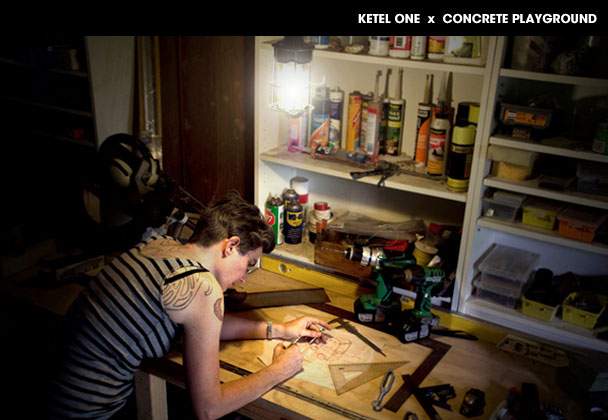Helen Bird: The Making of a Modern Craftswoman
We talk to Helen Bird, the recently announced winner of Ketel One’s Modern Craft Project, about transforming the humble food bicycle-cart into a literal vehicle for empowering migrants from disadvantaged backgrounds and how she plans to establish a lasting legacy with the $100,000 prize money.
As far as culinary memories go, for many Australians street food evokes holiday recollections of steaming pad Thai precariously balanced on a paper plate at a bustling Bangkok market, ketchup-laden three-for-$1 hot dogs in Times Square or condensed milk and peanut butter waffles relished on a hurried Hong Kong stopover.
As part of Ketel One's Modern Craft Project, Brisbane-based architect, designer and social entrepreneur Helen Bird drew inspiration from the success of a recent wave of street food vendors setting up mobile shop in other highly regulated countries to inform the mobile food project she launched earlier this year, which aims to satiate a growing hunger for not only international cuisine but socially and environmentally sound practice. In a bid to bring a little bit of holiday spirit to her urban surrounds in the form of quick, cost-effective and tasty fare, Bird personally designed an artfully constructed and environmentally sustainable spin on the humble bicycle-cart to peddle around the laneways of Brisbane.
Not one to be motivated by the pursuit of business success alone, Bird has harnessed the project as a literal vehicle through which to provide assistance for migrants and refugees wishing to enter the local food industry. Working with Street Food Australia (SFA), a social enterprise small business incubator established by Bird last year, participating protegees will take on the running of a bicycle-cart, while receiving the ongoing support and mentorship necessary to successfully establish a functioning business that serves food from their native culture. After raising start-up funds through the crowd sourcing website Pozible late last year, in February SFA launched their first street food vendor bike, a steamed dumpling cart, as part of a pilot designed to test the fundamentals of the project.
“Growing up my father was a bank manager who would lend money to migrants to start their first businesses. These families had no money, no business plan and the difficulty of a language barrier, but somehow when Dad would take me to their houses years later, they would be living in big, fancy places, thanks in part to the opportunity he gave them'”, says Bird, reflecting on what initially propelled her to fuse an acute understanding of business principles with her expert knowledge of craftsmanship to benefit the lives of those less fortunate.
To describe Bird's career path as unusual is conservative — she’s had a stint making circus equipment, spent time installing massive bamboo art sculptures in Europe and established a successful design studio, Pearler, with her "right-hand man and business partner" Billerwell Daye. Formal architecture training, a lifelong penchant for carpentry, welding, "repairing, rebuilding and picking apart everyday objects" and a commitment to doing things the long, hard way has allowed Bird to develop the formidable skillset necessary to craft the bicycle-carts used in the project, which are modeled on an economic, social, ecological and cultural sustainability quadruple bottom line.
"This project draws on diverse and complex processes, collaboration, old and new skills and the understanding that craft, design and society can meld together in exciting possibility to create something that helps other to achieve their full potential," explains Bird.
Much as Bird works to provide deserving migrants and refugees the kind of opportunities that hold the potential to completely re-route their futures, the Ketel One legacy, awarded to her this week, has opened up previously impossible avenues for the development and expansion of the project. Bird plans to direct the $100,000 prize money towards establishing an office and workshop away from home to draw, model and test the bicycle-carts and oversee the project, obtain core resources she currently lacks and even donate a bicycle-cart to a new vendor, dramatically reducing their start-up costs.
Like a true modern craftswoman, Bird seeks to achieve big changes through small acts carried out slowly and simply. If this starts with a bite of a mini banh-mi, tequila ribs or Mexican elote bought off the back of a travelling trike, that's an initiative we don't need to be asked twice to support. The training wheels are about to come off, thanks to the Ketel One legacy.






